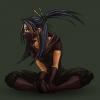I've been planning a text adventure for a long time now, and combat is the part that's been giving me some trouble. I'm trying to avoid "dice rolls" in my game, which makes matters worse, and I don't know if I can actually avoid it.
To give you a better idea of what I'm trying to achieve, this is not your ordinary text adventure but rather a more... graphical one, with actual buttons and maps, inventory, item icons, etc, and I'm even considering having some sort of NPC graphics for encounters and dialogues. Otherwise every feedback the player gets is text as usual.
In essence, my goal with the combat system would be, ideally, to provide the player with a chance to be skillful at it. But... again, I'm a bit at a loss on how to do such a thing in this type of game. So for now I'm trying to figure out in what ways can a text based game have combat, so that I can take as much into consideration as I can, and hopefully come up with something. Or if someone has any great ideas I'd be happy with that too. :)
Any help or insights would be greatly appreciated.








